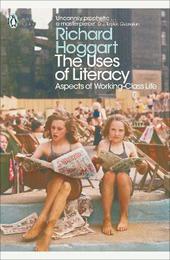
|
The Uses of Literacy: Aspects of Working-Class Life
Paperback / softback
Main Details
| Title |
The Uses of Literacy: Aspects of Working-Class Life
|
| Authors and Contributors |
By (author) Richard Hoggart
|
|
Contributions by Simon Hoggart
|
|
Introduction by Lynsey Hanley
|
| Series | Penguin Modern Classics |
|---|
| Physical Properties |
| Format:Paperback / softback | | Pages:400 | | Dimensions(mm): Height 198,Width 129 |
|
| Category/Genre | Literacy |
|---|
| ISBN/Barcode |
9780141191584
|
| Classifications | Dewey:302.230942 |
|---|
| Audience | |
|---|
|
Publishing Details |
| Publisher |
Penguin Books Ltd
|
| Imprint |
Penguin Classics
|
| Publication Date |
1 October 2009 |
| Publication Country |
United Kingdom
|
Description
With a new introduction by Lynsey Hanley and a Foreword by Simon Hoggart 'A vivid inside view of working-class culture and one of the most influential books of the postwar era' Observer When a society becomes more affluent, does it lose other values? Are the skills that education and literacy gave millions wasted on consuming pop culture? When Richard Hoggart asked these questions in his 1957 book The Uses of Literacy Britain was undergoing huge social change, yet his landmark work has lost none of its pertinence today. Drawing partly from his own boyhood, Hoggart gives a fascinating insight into the close-knit values of Northern England's vanishing working-class communities, and weaves this together with his views on the arrival of a new, homogenous 'mass' US-influenced culture. His headline-grabbing bestseller opened up a whole new area of cultural study and remains essential reading, both as a historical document, and as a commentary on class, poverty and the media.
Author Biography
Richard Hoggart was born in Leeds in 1918. He served with the Royal Artillery in North Africa from 1940 to 1946, after which he taught literature at the University of Hull, was visiting professor of English at the University of Rochester in America and senior lecturer in English at the University of Leicester. Professor Hoggart has been a member of numerous bodies and at different times was an Assistant Director-General of UNESCO, Chairman of the New Statesman and Vice-Chairman of the Arts Council. The Uses of Literacy, his most widely acclaimed work was partly autobiographical and drawn from his own boyhood growing up in the North of England.
|